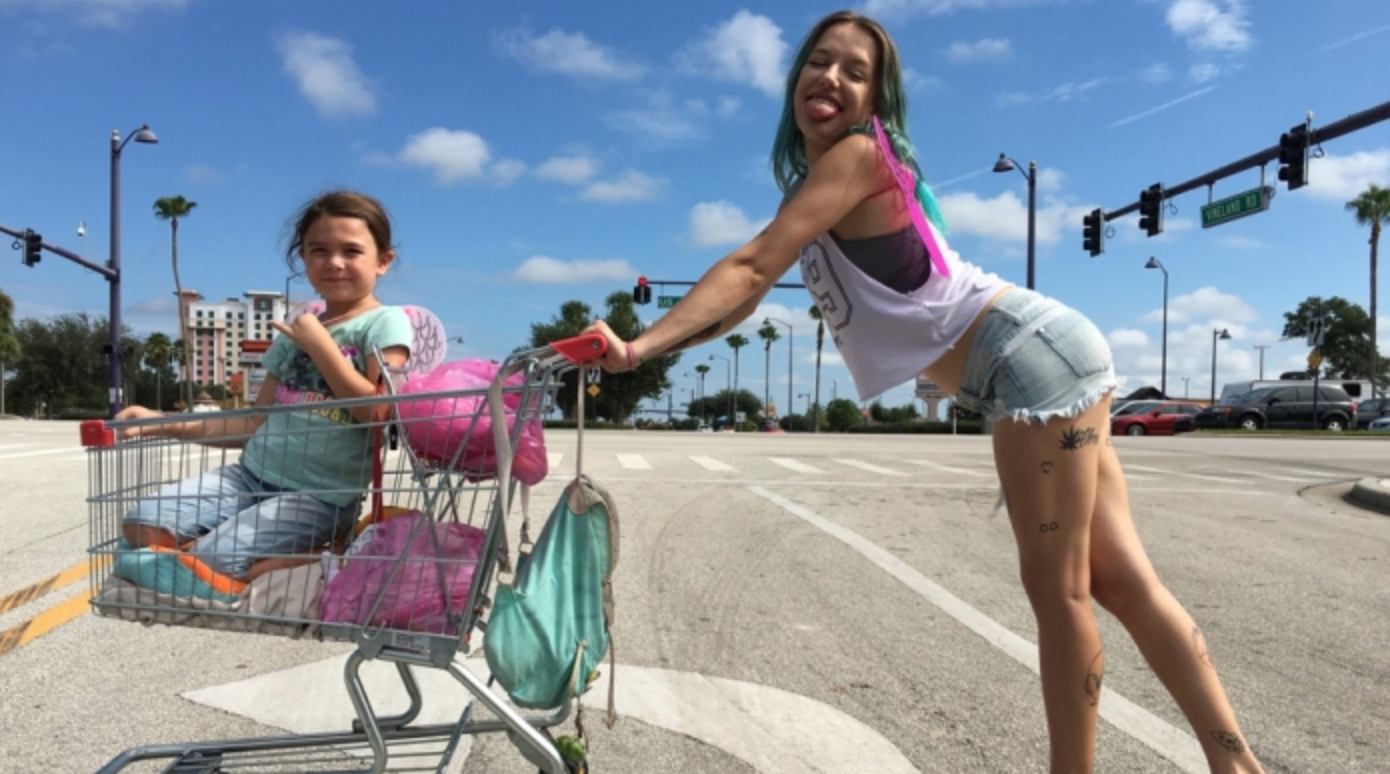It’s almost a rule of law that beneath the shiny, shellacked veneer of fun and good times, glitz and glamor, there lies a seedy underbelly. While this is to be expected of Las Vegas, where the environs off the strip are even more horrific than the skeevy club promoters and grotesque selfie takers that languish about the hotel block, it’s slightly less anticipated in a town so close to “The Happiest Place on Earth.” But that’s just it: six-year-old Moonee (Brooklynn Prince, who might get the chance to usurp Tatum O’Neal for youngest Oscar winner) doesn’t live quite within reach of this Disney location, but rather, outside of it in Kissimmee. Located just twenty minutes away from Celebration, Kissimmee isn’t without its own garish themed options (including Holy Land Experience, a Biblical history museum with live shows). Yet there is something lurking beneath it that is even more sinister; it’s a place where billboards reading “Pregnant?” loom above and hotels like Futureland (Stay in the Future Today!) and the Magic Castle house children forgotten by Disney.
Dripping irony, the opening credits play “Celebration” while the camera focuses on the unignorable purple hue of the Magic Castle. As a staple of this enclave of hotels, Moonee passes her days, in her mind, carefreely in the jurisdiction of her world, a pay-by-the-week motel named in honor of the same structure at Disney World (its name, unfortunately, ends up confusing one South American couple before it’s too late and they’ve already booked the wrong place for their honeymoon). With her friends, Scooty (Christopher Rivera) and Dicky (Aiden Malik), Moonee kicks off the summer with antics in spades, much to the dismay of the Magic Castle’s manager, Bobby (Willem Dafoe–Keanu Reeves as Hank in The Neon Demon he is not, in that he actually has compassion for the trash clientele he oversees). Though Bobby tries his best to come across as stern to Moonee and her erstwhile stripper mother, Halley (Bria Vinaite), his reserves of empathy seem always to bubble to the surface, save for when it comes to his own son, Jack (Caleb Landry Jones). While the latter commutes out of his way to help his father with cleaning up vacancies, moving refrigerators, etc, all of Bobby’s focus appears to be on protecting those who aren’t his own. The ultimate case in point of this is when he staves off an overt pedophile from Moonee and her new best friend, Jancey (Valeria Cotto), leading him to the soda machine he claimed to be roaming the hotel premises for as a non-guest.
Pandering to his story, Bobby leads him to the soda machine. And when Charlie Coachman (Carl Bradfield) of New Jersey doesn’t take a sip of the soda right away, Bobby states, “I thought you were thirsty.” Nervously, Charlie quickly takes a sip, only for Bobby to immediately knock it out of his hand and chase him off the property, threatening to call the police. This is just one of many “papa bear” moves Bobby enacts in his unofficial stead as guardian of both Moonee and Halley.
The darkness that exists amid the cracks outside The Happiest Place on Earth is something that perhaps only Sean Baker could convey with such acuity. As his second feature, The Florida Project–named so as an homage to the working title of the Walt Disney Resort–serves as a natural sequel, of sorts, to his microbudget debut, Tangerine (shot entirely on an iPhone). Both films employ the sunshiny backdrop of their respective milieus to unearth a more disquieting truth about the city: you can’t enjoy its benefits–the rainbow at the end of the rain–without sacrificing just a little bit (or a lot) of yourself to get it.
In Halley’s case, losing her stripping job, along with her best friend and mother to Scooty, Ashley (Mela Murder), forces her to engage in some dubious and illegal moneymaking endeavors in order to keep Moonee accustomed to her Magic Castle lifestyle. Thus, while Moonee takes baths to Spring Breakers-esque hip hop music (indeed, there are many Spring Breakers vibes throughout the film), Halley puts her body to use thanks to the sex ad she put up–photos of which Moonee took the pictures for under Halley’s direction, “Let’s take swimsuit selfies.”
Although some viewers might watch in horror at the revelation of just what these pictures turn out to be wielded for, Baker’s glaring commentary is on the increasing unattainability of the myth of the American dream: being “comfortable” by means of a “respectable” profession. Hence, the grand metaphor of Disney World being just within–but just out of–reach. For some of us, there is no hope, no rainbow above the Magic Castle, no matter how hard and how doggedly we try. It is in this way that the faint remnants of our childlike innocence are further dissolved every day. And still we cling to what’s left of the crumbs. As Moonee tells Jancey as they play among the grass atop a dilapidated, overturned tree, “You know what I like about this tree? It’s turned over, but it’s still growing.”






















